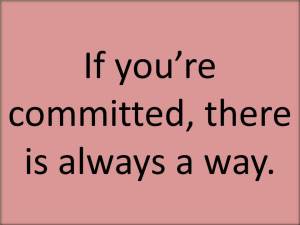 Some goals are best broken down in reverse order; others in a natural progression.
Some goals are best broken down in reverse order; others in a natural progression.
Examples: annual income you want to achieve; fitness goals you want to achieve
With income, it’s common to want to earn a particular amount by the end of the year. Let’s keep things simple and say $100,000, you bill hourly, and plan a 5-day, 40-hour week.
To break the goal down into manageable chunks (or at least a realistic perspective):
- $100,000/52 weeks = $1923/week
- determine number of non-working days for the year and remove them from your equation (if you plan 2 weeks of vacation: 100,000/50 weeks = $2000/week)
- how about holidays? Most years there are 10 federal holidays observed. In 2017, there are 11 because Inauguration Day is a federal holiday every four years.
- how about sick days? days off for kids (or elderly parents) being sick or needing to be driven somewhere? There’s no set way to predict the number of days, but you should throw in an estimate and get those days out of your total. Let’s say 9 sick (other) days to keep the math simple.
- 11 holidays, 9 sick (other) days = 4 more weeks off the work calendar. You now have 46 weeks which turns your weekly income goal into $2174.
- What is your billable rate? How many hours do you need to bill a week to attain $2174/week? (i.e. @$50 per hour, you’d have to bill out 44 hours/week)
There are so many variables at play with the income per year scenario. You need existing clients – finding and ramping up new clients takes time. If you bill a mix of hourly and per project, the formulas change.
If you want to lose 60 pounds in 12 months, that’s 5 pounds a month. You can figure out the best process (count calories, or work with calories and exercise) to reach the goal.
For a general overall fitness improvement goal you start with where you are today instead of working backwards and work to improve.
I find different ‘challenges’ for fitness to be quite beneficial — they are 21 or 30 days long and help you build up incrementally and naturally. You can do a Google search on “fitness challenge” (or be specific about the type of challenge) and find plenty of ideas.
- For whatever activity it is, measure where you are now – total pounds you lift for weights, # of pull ups you can do, how long you can plank, how fast you can run a mile, and so on.
- Then you work at those activities at least a couple of times a week and consistently measure your improvement.
- You can also track calories and keep a food diary (so many online apps nowadays, I use MyFitnessPal) to learn how to make better food choices.
Are you ready to break your ‘big’ goals into smaller manageable chunks and get them into your weekly and daily plans?
 Lisa J. Jackson is an independent writer and editor who enjoys working with businesses of all sizes. She loves researching topics, interviewing experts, and helping companies tell their stories. You can connect with her on Twitter, Facebook, and LinkedIn.
Lisa J. Jackson is an independent writer and editor who enjoys working with businesses of all sizes. She loves researching topics, interviewing experts, and helping companies tell their stories. You can connect with her on Twitter, Facebook, and LinkedIn.





















